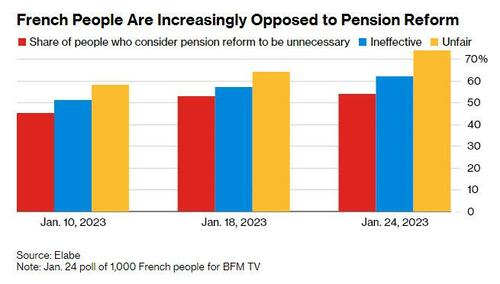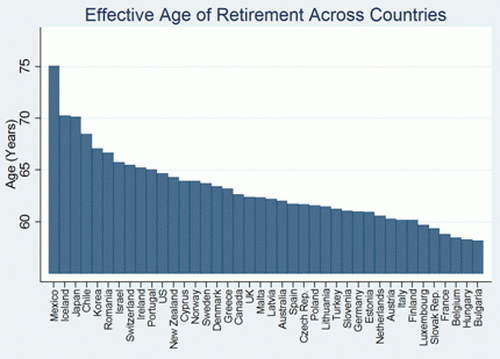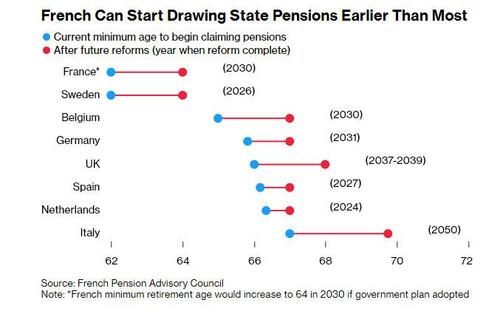"The study analyzed average yearly salaries state by state, accounting
for taxes to arrive at a potential monthly take-home pay. Following a
widely accepted financial guideline, the study suggests allocating your
post-tax income in the following way: 50% for necessities, 30% for
discretionary expenses, and 20% for savings. This should only take the average American 22 years to save with
compound interest, the zine says. In extreme circumstances, for those
who want to live to the oldest recorded age of 122, one would
need $2,963,879 saved the study says."
Experience
Bernard English

FREE 30-minute trial classes available!
Online English Tutor/Teacher

- Native Speaker of American English Conversation practice. Chatting or in-depth discussion of news articles. TOEFL-IELTS practice / CV, SOP, journal paper, essay revision 英語家教 彈性排課, 免通勤, 托福, 職場英文, 履歷/論文修改…等。 請看我的學生推薦信。
Search This Blog
email: bernard.english@gmail.com
Friday, October 20, 2023
Average American Only Needs $658k To Retire, One Study Shows | Zero Hedge
 Native Speaker of American English
Conversation practice. Chatting or in-depth discussion of news articles.
TOEFL-IELTS practice / CV, SOP, journal paper, essay revision
英語家教
彈性排課, 免通勤, 托福, 職場英文, 履歷/論文修改…等。
請看我的學生推薦信。
Native Speaker of American English
Conversation practice. Chatting or in-depth discussion of news articles.
TOEFL-IELTS practice / CV, SOP, journal paper, essay revision
英語家教
彈性排課, 免通勤, 托福, 職場英文, 履歷/論文修改…等。
請看我的學生推薦信。
Friday, February 3, 2023
France Hit By Strikes, Protests Amid Outrage At Hiking Retirement Age To 64 by Tyler Durden SOURCE: Zero Hedge



 Native Speaker of American English
Conversation practice. Chatting or in-depth discussion of news articles.
TOEFL-IELTS practice / CV, SOP, journal paper, essay revision
英語家教
彈性排課, 免通勤, 托福, 職場英文, 履歷/論文修改…等。
請看我的學生推薦信。
Native Speaker of American English
Conversation practice. Chatting or in-depth discussion of news articles.
TOEFL-IELTS practice / CV, SOP, journal paper, essay revision
英語家教
彈性排課, 免通勤, 托福, 職場英文, 履歷/論文修改…等。
請看我的學生推薦信。
Friday, June 25, 2021
Long-Term Care: Last Week Tonight with John Oliver (HBO)
 Native Speaker of American English
Conversation practice. Chatting or in-depth discussion of news articles.
TOEFL-IELTS practice / CV, SOP, journal paper, essay revision
英語家教
彈性排課, 免通勤, 托福, 職場英文, 履歷/論文修改…等。
請看我的學生推薦信。
Native Speaker of American English
Conversation practice. Chatting or in-depth discussion of news articles.
TOEFL-IELTS practice / CV, SOP, journal paper, essay revision
英語家教
彈性排課, 免通勤, 托福, 職場英文, 履歷/論文修改…等。
請看我的學生推薦信。
Wednesday, April 24, 2019
Europe's Pension Funds Are Running Low As Boomers Retire by John Mauldin FROM Forbes
 Native Speaker of American English
Conversation practice. Chatting or in-depth discussion of news articles.
TOEFL-IELTS practice / CV, SOP, journal paper, essay revision
英語家教
彈性排課, 免通勤, 托福, 職場英文, 履歷/論文修改…等。
請看我的學生推薦信。
Native Speaker of American English
Conversation practice. Chatting or in-depth discussion of news articles.
TOEFL-IELTS practice / CV, SOP, journal paper, essay revision
英語家教
彈性排課, 免通勤, 托福, 職場英文, 履歷/論文修改…等。
請看我的學生推薦信。
Sunday, July 9, 2017
Healthcare in Sweden: A Model of Elderly Care By Stephanie Clarke FROM Seniors Matter
 Native Speaker of American English
Conversation practice. Chatting or in-depth discussion of news articles.
TOEFL-IELTS practice / CV, SOP, journal paper, essay revision
英語家教
彈性排課, 免通勤, 托福, 職場英文, 履歷/論文修改…等。
請看我的學生推薦信。
Native Speaker of American English
Conversation practice. Chatting or in-depth discussion of news articles.
TOEFL-IELTS practice / CV, SOP, journal paper, essay revision
英語家教
彈性排課, 免通勤, 托福, 職場英文, 履歷/論文修改…等。
請看我的學生推薦信。
Monday, May 25, 2015
MIT alumni in their 50s by Philip Greenspun
 Native Speaker of American English
Conversation practice. Chatting or in-depth discussion of news articles.
TOEFL-IELTS practice / CV, SOP, journal paper, essay revision
英語家教
彈性排課, 免通勤, 托福, 職場英文, 履歷/論文修改…等。
請看我的學生推薦信。
Native Speaker of American English
Conversation practice. Chatting or in-depth discussion of news articles.
TOEFL-IELTS practice / CV, SOP, journal paper, essay revision
英語家教
彈性排課, 免通勤, 托福, 職場英文, 履歷/論文修改…等。
請看我的學生推薦信。
Tuesday, June 19, 2012
Top five regrets of the dying by Susie Steiner FROM The Guardian
 Native Speaker of American English
Conversation practice. Chatting or in-depth discussion of news articles.
TOEFL-IELTS practice / CV, SOP, journal paper, essay revision
英語家教
彈性排課, 免通勤, 托福, 職場英文, 履歷/論文修改…等。
請看我的學生推薦信。
Native Speaker of American English
Conversation practice. Chatting or in-depth discussion of news articles.
TOEFL-IELTS practice / CV, SOP, journal paper, essay revision
英語家教
彈性排課, 免通勤, 托福, 職場英文, 履歷/論文修改…等。
請看我的學生推薦信。
Sunday, June 10, 2012
Are Childless People Freeloading on the World's Parents? by David Berre FROM Big Think
 Native Speaker of American English
Conversation practice. Chatting or in-depth discussion of news articles.
TOEFL-IELTS practice / CV, SOP, journal paper, essay revision
英語家教
彈性排課, 免通勤, 托福, 職場英文, 履歷/論文修改…等。
請看我的學生推薦信。
Native Speaker of American English
Conversation practice. Chatting or in-depth discussion of news articles.
TOEFL-IELTS practice / CV, SOP, journal paper, essay revision
英語家教
彈性排課, 免通勤, 托福, 職場英文, 履歷/論文修改…等。
請看我的學生推薦信。
Saturday, December 31, 2011
Power Up Your Brain By Terri Needels, Ph.D. FROM Psychology Today [PAGE 1 ONLY!!!]
"So patients who are better educated or more intellectually engaged seem better able to compensate for the disease, lending credence to the brain-reserve theory."
 Native Speaker of American English
Conversation practice. Chatting or in-depth discussion of news articles.
TOEFL-IELTS practice / CV, SOP, journal paper, essay revision
英語家教
彈性排課, 免通勤, 托福, 職場英文, 履歷/論文修改…等。
請看我的學生推薦信。
Native Speaker of American English
Conversation practice. Chatting or in-depth discussion of news articles.
TOEFL-IELTS practice / CV, SOP, journal paper, essay revision
英語家教
彈性排課, 免通勤, 托福, 職場英文, 履歷/論文修改…等。
請看我的學生推薦信。
Sunday, September 11, 2011
The Social Security 'Ponzi Scheme' by Chriss W. Street FROM Big Government
"The Social Security taxes on her salary were $24.75; her initial monthly check was $22.54; and she lived to collect $22,888.92. Essentially, Ms. Fuller earned a spectacular 925% return on her investment."
 Native Speaker of American English
Conversation practice. Chatting or in-depth discussion of news articles.
TOEFL-IELTS practice / CV, SOP, journal paper, essay revision
英語家教
彈性排課, 免通勤, 托福, 職場英文, 履歷/論文修改…等。
請看我的學生推薦信。
Native Speaker of American English
Conversation practice. Chatting or in-depth discussion of news articles.
TOEFL-IELTS practice / CV, SOP, journal paper, essay revision
英語家教
彈性排課, 免通勤, 托福, 職場英文, 履歷/論文修改…等。
請看我的學生推薦信。
Saturday, August 6, 2011
People should focus on their savings, not withdrawals FROM The Economist
"On Mr Pfau’s assumptions, someone who saved 16.6% of their income for 30 years would always have had a pot large enough to meet their retirement needs."
 Native Speaker of American English
Conversation practice. Chatting or in-depth discussion of news articles.
TOEFL-IELTS practice / CV, SOP, journal paper, essay revision
英語家教
彈性排課, 免通勤, 托福, 職場英文, 履歷/論文修改…等。
請看我的學生推薦信。
Native Speaker of American English
Conversation practice. Chatting or in-depth discussion of news articles.
TOEFL-IELTS practice / CV, SOP, journal paper, essay revision
英語家教
彈性排課, 免通勤, 托福, 職場英文, 履歷/論文修改…等。
請看我的學生推薦信。
Sunday, January 9, 2011
Do we care enough for our elderly parents? FROM BBC
"The Chinese government is considering making it a legal duty for people to visit their aged parents."
 Native Speaker of American English
Conversation practice. Chatting or in-depth discussion of news articles.
TOEFL-IELTS practice / CV, SOP, journal paper, essay revision
英語家教
彈性排課, 免通勤, 托福, 職場英文, 履歷/論文修改…等。
請看我的學生推薦信。
Native Speaker of American English
Conversation practice. Chatting or in-depth discussion of news articles.
TOEFL-IELTS practice / CV, SOP, journal paper, essay revision
英語家教
彈性排課, 免通勤, 托福, 職場英文, 履歷/論文修改…等。
請看我的學生推薦信。
Monday, November 29, 2010
Six Things Seniors Can Do To Improve Memory by William Klemm, D.V.M., Ph.D. FROM Psychology Today
"Research shows that aging reduces a person's ability to focus and pay attention."
 Native Speaker of American English
Conversation practice. Chatting or in-depth discussion of news articles.
TOEFL-IELTS practice / CV, SOP, journal paper, essay revision
英語家教
彈性排課, 免通勤, 托福, 職場英文, 履歷/論文修改…等。
請看我的學生推薦信。
Native Speaker of American English
Conversation practice. Chatting or in-depth discussion of news articles.
TOEFL-IELTS practice / CV, SOP, journal paper, essay revision
英語家教
彈性排課, 免通勤, 托福, 職場英文, 履歷/論文修改…等。
請看我的學生推薦信。
Thursday, July 29, 2010
What Bruno Bettelheim Taught Me About Nursing Homes By Ira Rosofsky, Ph.D. FROM Psychology Today
"Beyond face-time, the School was based on Bettelheim's observation that if the extreme conditions of the Dachau concentration camp could have very negative effects on behavior, an extremely good condition could have strong put positive effects on behavior too."
 Native Speaker of American English
Conversation practice. Chatting or in-depth discussion of news articles.
TOEFL-IELTS practice / CV, SOP, journal paper, essay revision
英語家教
彈性排課, 免通勤, 托福, 職場英文, 履歷/論文修改…等。
請看我的學生推薦信。
Native Speaker of American English
Conversation practice. Chatting or in-depth discussion of news articles.
TOEFL-IELTS practice / CV, SOP, journal paper, essay revision
英語家教
彈性排課, 免通勤, 托福, 職場英文, 履歷/論文修改…等。
請看我的學生推薦信。
Tuesday, January 26, 2010
On old age by Aristotle FROM Google Books
- For because they have lived many years, have been deceived in many things, and have erred, and because the greater part of human affairs is bad, hence they do not firmly assert any thing, and estimate all things less than is proper.
- They likewise opine, but know nothing; and being involved in doubt they always add perhaps, and it may be. And in this manner they speak on every subject; but they assert nothing stably.
- They are also illnatured ; for illnature consists in putting the worst construction on every thing.
- Farther still, they are suspicious from their incredulity, but they are incredulous from their experience.
- They are also pusillanimous, because they have become abject through length of years; for they desire nothing great or illustrious, but those things only which are necessary to the support of life.
- They are likewise illiberal; for one of the necessaries of life is property ; but at the same time from experience they know how difficult the acquisition of wealth is, and how easily it is lost.
- They are also timid, and are afraid of every thing beforehand.
- And they live with a view to what is advantageous, and not with a view to what is beautiful in conduct, more than is proper, because they are lovers of themselves.
 Native Speaker of American English
Conversation practice. Chatting or in-depth discussion of news articles.
TOEFL-IELTS practice / CV, SOP, journal paper, essay revision
英語家教
彈性排課, 免通勤, 托福, 職場英文, 履歷/論文修改…等。
請看我的學生推薦信。
Native Speaker of American English
Conversation practice. Chatting or in-depth discussion of news articles.
TOEFL-IELTS practice / CV, SOP, journal paper, essay revision
英語家教
彈性排課, 免通勤, 托福, 職場英文, 履歷/論文修改…等。
請看我的學生推薦信。
Friday, September 4, 2009
A Reluctance to Retire Means Fewer Openings By CATHERINE RAMPELL and MATTHEW SALTMARSH FROM The New York Times
"Retirement income typically comes from a combination of three buckets: state pensions, corporate pensions and individual arrangements. In many other industrialized countries, that first bucket — state pensions — supports a large amount of retirees’ income.The typical American receives just 45 percent of his preretirement wage through Social Security, according to the Organization of Economic Cooperation and Development."
 Native Speaker of American English
Conversation practice. Chatting or in-depth discussion of news articles.
TOEFL-IELTS practice / CV, SOP, journal paper, essay revision
英語家教
彈性排課, 免通勤, 托福, 職場英文, 履歷/論文修改…等。
請看我的學生推薦信。
Native Speaker of American English
Conversation practice. Chatting or in-depth discussion of news articles.
TOEFL-IELTS practice / CV, SOP, journal paper, essay revision
英語家教
彈性排課, 免通勤, 托福, 職場英文, 履歷/論文修改…等。
請看我的學生推薦信。
Wednesday, June 24, 2009
In Old Age, Friends Can Keep You Young. Really By Anita Hamilton FROM Time
"Going to the ballpark, visiting friends and playing bingo are simple diversions for many of us. But for the elderly, these social pastimes may play a critical role in preserving their physical and mental health."
 Native Speaker of American English
Conversation practice. Chatting or in-depth discussion of news articles.
TOEFL-IELTS practice / CV, SOP, journal paper, essay revision
英語家教
彈性排課, 免通勤, 托福, 職場英文, 履歷/論文修改…等。
請看我的學生推薦信。
Native Speaker of American English
Conversation practice. Chatting or in-depth discussion of news articles.
TOEFL-IELTS practice / CV, SOP, journal paper, essay revision
英語家教
彈性排課, 免通勤, 托福, 職場英文, 履歷/論文修改…等。
請看我的學生推薦信。
Wednesday, April 2, 2008
A Penny Saved is a Penny Spent
As talk of recession and belt-tightening makes headlines, I wonder where and how I lost my grandfather's sense of thrift. Like many young professionals (I'm 36), I embraced the lessons of my seniors about hard work. Yet my generation racks up debt the way our grandparents used to squirrel away pennies. A study by the Journal of Consumer Research to be released next month, titled "Tightwads and Spendthrifts," finds that people ages 18 to 40 are most likely to say they're spending beyond their comfort range. While my grandfather refused to take out a mortgage, I bought my first two-bedroom condo (in a marginal neighborhood) for $450,000 two years ago with 5 percent down and an interest-only loan for the next seven years (note to boss: please don't ever fire me). Though mired in debt, I still manage to sleep most nights. "Your generation has a completely different attitude about going into debt," says George Loewenstein, professor of economics and psychology at Carnegie Mellon, who says the availability of cheaper goods, as well as Internet shopping and longer store hours, make it far easier to waste money. "It used to be that the simple opening and closing of store doors exerted some control on spending. That's all gone now," he says.
 Native Speaker of American English
Conversation practice. Chatting or in-depth discussion of news articles.
TOEFL-IELTS practice / CV, SOP, journal paper, essay revision
英語家教
彈性排課, 免通勤, 托福, 職場英文, 履歷/論文修改…等。
請看我的學生推薦信。
Native Speaker of American English
Conversation practice. Chatting or in-depth discussion of news articles.
TOEFL-IELTS practice / CV, SOP, journal paper, essay revision
英語家教
彈性排課, 免通勤, 托福, 職場英文, 履歷/論文修改…等。
請看我的學生推薦信。
Monday, March 24, 2008
Moving back home at middle age FROM CNN.com
Taking shelter with parents isn't uncommon for young people in their 20s, especially when the job market is poor. But now the slumping economy and the credit crunch are forcing some children to do so later in life -- even in middle age.
Financial planners report receiving many calls from parents seeking advice about taking in their grown children following divorces and layoffs.
Kim Foss Erickson, a financial planner in Roseville, California, north of Sacramento, said she has never seen older children, even those in their 50s, depending so much on their parents as in the last six months.
 Native Speaker of American English
Conversation practice. Chatting or in-depth discussion of news articles.
TOEFL-IELTS practice / CV, SOP, journal paper, essay revision
英語家教
彈性排課, 免通勤, 托福, 職場英文, 履歷/論文修改…等。
請看我的學生推薦信。
Native Speaker of American English
Conversation practice. Chatting or in-depth discussion of news articles.
TOEFL-IELTS practice / CV, SOP, journal paper, essay revision
英語家教
彈性排課, 免通勤, 托福, 職場英文, 履歷/論文修改…等。
請看我的學生推薦信。
Labels
- 1. Oral Speech (20)
- 2. Writing Tips (11)
- 3. Oral Presentation (5)
- 4. Vocabulary (33)
- 5. Grammar (7)
- 6. Applying for a Job (18)
- 7. Applying to Schools (20)
- 8. Test Preparation (6)
- 9. Audio/Video (230)
- 9. Audio/Video Military (5)
- Africa (2)
- Animals (8)
- Art (13)
- audio (1)
- BBC Learning English (2)
- Biography (21)
- biology (32)
- Book Review (22)
- Business (195)
- by Bernard (23)
- Case Studies (3)
- Celebrities (2)
- China (18)
- Clothes (9)
- Colbert (1)
- Computers/Internet (124)
- Covid (85)
- Crime (144)
- crime. military (2)
- Culture/Ethnicity (92)
- Eco (1)
- Economics (524)
- Education (159)
- Energy (1)
- Environment (93)
- Ethics (110)
- ethni (1)
- ethnic (2)
- Europe (1)
- Family (42)
- Finance (8)
- Food (77)
- Gender (33)
- Government (9)
- Health (279)
- History (18)
- Hobbies (9)
- housing (4)
- Humor (54)
- Immigration (32)
- Inspiration (5)
- International Comparisons (12)
- Investing (74)
- Japanese Classes (1)
- Japanese Vocabulary (4)
- Language (46)
- Law (133)
- Libertarian (3)
- Lockdowns crime (1)
- Media (59)
- Military (368)
- Miscellaneous (81)
- Movie Review (3)
- Music (13)
- Obituary (1)
- pandemic (4)
- poli (1)
- Politics (367)
- Psychology (267)
- Quizzes (1)
- Quotes (22)
- Religion (46)
- Romance/Marriage (57)
- Science (187)
- Shopping (10)
- Sports (77)
- Supernatural and UFO (6)
- Taiwan (29)
- Television and Movies (14)
- The Elderly (4)
- The Elderly/Retirement (19)
- The Youth (33)
- TOEFL (2)
- Transportation (51)
- Travel (20)
- U.S. (3)
- US History (49)
- USA (26)
- Vices (28)
- War (4)
- Weather (5)
- Work (119)
- Writing Contest (7)